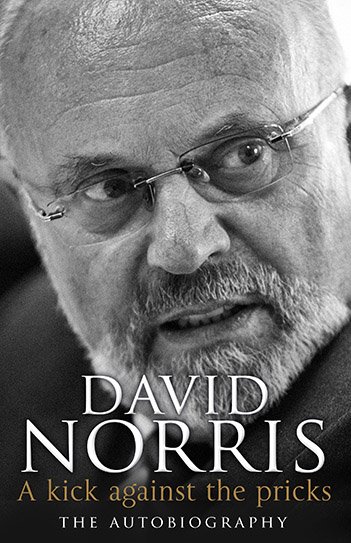‘A Kick Against the Pricks: The Autobiography’ by David Norris.

Context is key. If I took anything from David Norris’ autobiography it is this.
It is a full-blooded expression of his personality, in which we get explanations for each of his varied interests, ranging from his involvement in the gay rights movement, through his love of architecture, down to his spiritual beliefs. He is a writer who doesn’t believe in soundbites or dogma; rather he revels in nuance. Even when he discusses his religious beliefs, there is no moment of blind obedience to scripture – there is a great moment where he explains that he refuses to say “We believe“ in church because he can’t presume to know what his neighbour believes. Instead he says “I believe.“ This insistence on nuance defines the tone of Norris’ book.
His central thesis appears to be a riposte to soundbite culture and the media – which comes about largely as a result of his battering during the presidential election. A significant portion is devoted to exploring his feelings growing up as a gay man in the 1950s and 60s and his touching relationship with Ezra, a long-term on-and-off-again boyfriend with whom he sometimes shares a home. While this is moving in and of itself, its greater importance is revealed later when Norris’ letters for Ezra’s clemency are released during the election; the letters in which Norris pleads for lenience when Ezra is accused of sleeping with a minor. The emotional complexity of the situation is laid out for us – a complexity which refuses to be reduced to soundbites and headlines.
We come to understand that Norris is a man of principle, and there are really only a few big principles from which he works. Politics comes second – it is more important to him that he stands up for what he believes in and helps the vulnerable. One begins to wonder why such a genuine agent of change gets such harsh treatment in public life, when career politicians remain virtually untouched. It is particularly disgusting to read of the homophobic slurs he was subjected to during the election.
I was reminded of the recent documentary Mitt, about the personal life Mitt Romney. Mitt’s politics notwithstanding, the documentary gives us an insight into the nuanced views and genuine desire to help people that become truncated when put in front of a camera or quoted in a newspaper. I believe that Mitt and Norris – though politically polar opposites – come from a similar school of thought: they are both good people who are very naive about how to represent themselves in public. The difference is that Mitt is a businessman: he rises to the challenges and tries to turn his ideas into soundbites. Norris, on the other hand, is an academic and a thinker. He refuses to give people what they want and engages heartily in lengthy intellectual discussion. Even here Norris casually says things like “I consider myself to be a communist“, and within the context of the book we can understand where he’s coming from. For the press, though, this makes him a goldmine of controversial quotes. There is a great line in the book where a friend of Norris’ says of his election controversies that Norris “works with ideas, but you can’t work with ideas in a bearpit.“
Norris’ great desire for discussion leads him to question everything. One is left impressed by the sheer audacity of his personality and his strong belief in justice and change. As a devout Christian he is still able to question the church with lines such as the following: “This is a Church that, under the last two popes, continually spoke about dialogue. The whole meaning of the word ‘dialogue’ has been turned on its head and it now appears to mean ‘Sit down, shut up and do what you’re told because I’m the Pope.’“ We’ve seen from his speeches in the Seanad that this is a principle he adheres to in every aspect of his life.
For all the political difficulties he faces, I was surprised at the sheer volume of achievements in Norris’ life. He comes across as somebody who throws himself wholeheartedly into public service. I would hope that, by reading his autobiography, young people will be encouraged to stick to their principles and to know that, yes, they may end up as political outsiders – but there is still room in this country for people with strong principles and the courage to stick to them.

